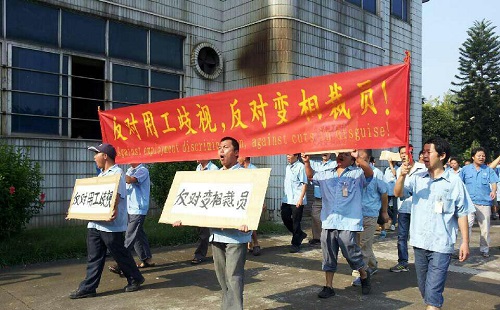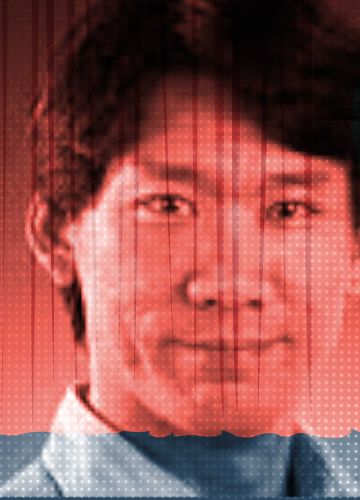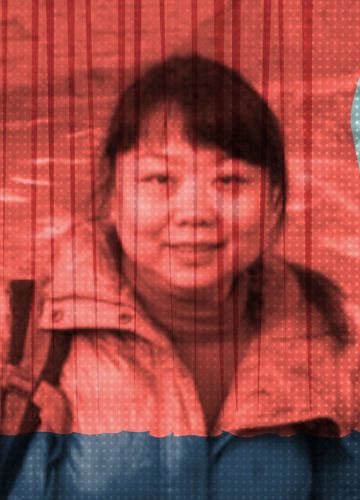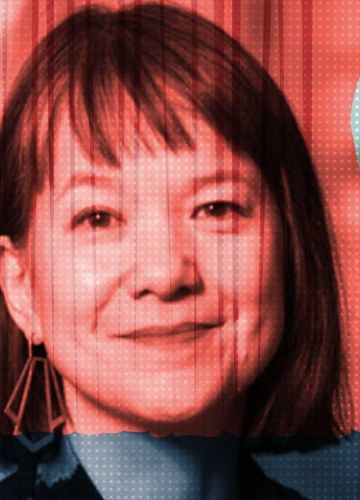Angels and Demons

David Bandurski

Anthony Spires
In the spring of 2013, just months after Xi Jinping came to power, reports emerged that the Chinese Communist Party had released a high-level document warning against “infiltration” of the country by dangerous ideas from the outside. When the document was published in full later that year by the US-based Mingjing Magazine, it detailed a range of perceived ideological threats, including the notion of civil society. Document 9, as the text came to be known, portrayed civil society as a threat to CCP rule: “Advocates of civil society want to squeeze the Party out of the leadership of the masses at the local level,” it said ominously, “even setting the Party against the masses, to the point that their advocacy is becoming a serious form of political opposition.”
Document 9 marked a more dramatic expression of the anxieties of China’s leadership toward global civil society. But it was also a reflection of tensions that had been at the heart of China’s relationship with civil society since its development in China in the early post-Mao era. To discuss the history of these tensions, and their relevance today, CMP sat down with Anthony Spires, an Associate Professor at the University of Melbourne’s Centre for Contemporary Chinese Studies, whose research on China has encompassed civil society, political sociology, organizational development, and philanthropy. Released in April this year, Spires’ most recent work, Global Civil Society and China, looks at the country’s conflicted relationship with global civil society.
__________________
David Bandurski: In your monograph, you write about China’s unstable relationship with the idea of “civil society” — how it totters between the hope of enlightenment and the threat of national security. Maybe you could start by bringing us up to speed on the history of civil society development in China, and how it has grappled with this relationship.
Anthony Spires: There’s a long history of community association in dynastic times, of course, but the most recent introduction of “civil society” started in the 1980s, when there was much anticipation – and expectation in and outside China – that Deng Xiaoping’s economic reforms would also lead to political reform. The violent crackdown on the protests of 1989, though, put an end to speculation about political reform, especially the hope that the government might tolerate community-based groups outside its control.
The protests also led to the birth of what we now call government-organized nongovernmental organizations or GONGOs. The basic idea there is that with the 1989 protests the government suddenly became aware of deep problems within a rapidly changing society, so it mobilized party members and state agencies to ‘go into’ society, find out what the problems were, then report back with policy suggestions. GONGOs were originally meant to be a kind of ‘transmission belt’, figuring out what problems people were encountering in society, reporting up to policymakers, then sending new policies back down into society to fix the problems. So, GONGOs are one part of the story of associational life in China.
But then, with the UN Conference on Women held in Beijing in 1995, the government was required to also allow an international NGO Forum to be held at the same time. That forum is widely credited with introducing the idea of independent, bottom-up civil society organizations into post-Mao China. Although it was focused on women – including women’s rights, education for girls, and other related issues – the forum also legitimated community-based activity on a whole range of issues, from the environment to ethnic minority concerns to labor rights.
Bandurski: That time, in the late 1990s, was also when a new era of commercialized media took off in China, not to mention the birth of the Chinese internet. Did that help to spread this idea even further?
It took a few years for the idea of an NGO to spread beyond Beijing and a couple of other major cities, but the rise of the internet in the early 2000’s helped usher in a wave of grassroots NGOs in the Hu-Wen era. So, by the time I started researching these issues in 2004, there were a range of groups operating on all kinds of ‘new’ social issues, everything from HIV to autism and LGBTQ+ rights, and rural educational inequality to environmental protection. Even groups supporting sex workers – although sex work was and remains illegal in China – emerged during this period.
The rise of the internet in the early 2000’s helped usher in a wave of grassroots NGOs.
All of this happened, to be sure, alongside an influx of global civil society actors. The Women’s Conference in 1995 was a massive, attention-getting event, but prior to that, in the 1980s, the PRC government itself had begun inviting INGOs, international NGOs, to come in. Groups like the Ford Foundation, Oxfam, and a lot of others began advising and eventually running programs on everything from disaster relief to – in the case of Ford – the re-establishment of sociology as an academic discipline at universities.
Bandurski: That’s an interesting case of the benefits of global civil society engagement. What other issues were a focus then? We often hear about the environment as a can-go issue.
Spires: Yes, a number of groups went into Yunnan, in the southwest, to work on a range of environmental protection issues, which eventually grew to include work with ethnic minority groups, women’s economic empowerment, education, drug addiction treatment facilities, and other issues.

Guangdong, in particular, became a hotspot for labor rights activism, in no small part due to direct influences from NGOs based across the border in Hong Kong.
Although the PRC state had itself invited INGOs and actively lobbied to host the UN Women’s Conference, by around 2005 at least parts of the party had become worried that the ‘Color Revolutions’ of Europe and Central Asia might spread to its own territories. Claims that domestic and international NGOs were working as agents of foreign governments, supported by foreign money, began circulating in elite circles and, eventually, within academia and the official press.
Bandurski: In your book you use this concept, or contrast, of angels and demons.
That’s right. It was in this context that Zhao Liqing, a professor at the Central Party School, penned a short analysis asking whether INGOs – and, by extension, global civil society – were ‘angels’ helping China or ‘demons’ out to bring down the CCP and overthrow the state.
Zhao summarized the arguments of the conservative critics of INGOs, but he also noted the positive contributions they had made to China, including funding, new ideas, and new methods for addressing social problems. On balance, he concluded, INGOs were a net positive, although the country still needed to be on guard against potential negative impacts.
Bandurski: National security thinking seems always to be in the foreground in China in these days. Having observed Chinese civil society over the past couple of decades, how do you think this security mindset has impacted groups and activities on the ground?
Spires: National security concerns have grown since Zhao Liqing published his article in 2006, and they remain a constant concern not just for the state but also for Chinese civil society groups. NGOs, activists, and scholar-activists (of which there are a few at Chinese universities) have learned they need to be aware of the political wrangling over the desirability of international influences. Leading up to the 2014 Occupy Central and Umbrella Movement protests in Hong Kong, many Chinese NGOs were visited by authorities coming to check their financial records, demanding they disclose any and all contact with overseas NGOs, including those from Hong Kong.
Just a couple of years later, with the development of the INGO Law in 2016, another wide-ranging discussion of foreign influences took place within domestic NGOs, as well as within academic institutions. There were many academics at universities and at government think tanks who had been beneficiaries of foreign foundation monies, of course, taking overseas trips or being sponsored for short exchanges or periods of study at overseas universities. In short, the overall level of attention, and suspicion of any overseas connections, has just grown in the past 10 years.
With the 2019 protests in Hong Kong, of course, Hong Kong connections were thrust into the limelight again, so that nowadays many groups have to be much more circumspect and cautious when considering working with foreign NGOs, even those with approved operations and offices in the Chinese mainland.
Bandurski: Are there other factors, aside from national security, that have shaped civil society development in China?
Spires: I think national security is a common thread running through the last 20 years of civil society development, for sure. But another big change is the rise of domestic philanthropy. As Chinese entrepreneurs have gotten richer – some very, very rich – there’s been a push from the government to have them contribute to government-approved causes like education. And, of course, many entrepreneurs are also keen to ‘give back’ to society, working on government priority issues like education but also health care, the environment, and other issues they personally care about.
The overall level of attention, and suspicion of any overseas connections, has just grown in the past 10 years.
And the rise of social media – where people can put out calls for help – and offer help to others – has also changed the civil society scene quite dramatically. These are developments that can largely be seen as a result of economic growth, but I’d say their impacts on civil society are things we’re only just beginning to make sense of. Overall, it means there’s more money going towards ‘charitable causes’, and while the government would like to direct those funds where it wants them, it also opens up space to talk about the things grassroots actors are doing and the values and goals that underpin their efforts. That, in turn, means there’s increased awareness of civil society, again expanding the realm of what’s possible and the conversations people can have about what different groups in society need.
Bandurski: That growing awareness is a good segue into the question of shared values. A key point you make in your exploration of rhetoric and reality is that the idea of “universal values,” including broader notions of human rights and democracy, has gained currency. Many observers of China will have a knee-jerk response to this. How is this possible, they might say, when we know that even a high-level CCP document right at the start of Xi’s first term more than a decade ago explicitly rejected the idea of civil society, freedom of speech, constitutionalism and so on. . . My question is getting long. But could you tease out this question of rhetoric and reality? How is the Party leadership deploying its own rhetoric, how is civil society responding, and where do you see this gain in currency you write about?
Spires: Many groups that may appear as ‘non-governmental’ to people outside China are in reality PRC government creations. I wouldn’t see this as a trend, though, but rather as long-standing standard operating practice. In the book I recall meeting a civil servant in Guangdong almost twenty years ago who had multiple cards – or ‘hats’, as he called them. He normally wore his government hat in his day-to-day life, but when heading overseas he and his colleagues put on their GONGO hats so that they could get permission to leave the country more easily – there are lots of restrictions on government officials traveling overseas (even more nowadays, actually). But, as he said, wearing that GONGO hat also makes it easier to talk with foreigners.
Granted, what ‘easier’ means is up for debate, but clearly in part it means that Chinese officials have worked out that NGOs are here to stay, globally, and that GONGOs offer access to doing things overseas that may not be so easy in their PRC government official role. This is a fair assessment, I’d say. Whether foreigners should be surprised or especially concerned, however, is probably up to the context and what’s at stake morally or practically. But, inside China itself, the context is very clear – no organization with ‘China’ in its official name is going to be anything but state-approved and state-controlled.
That doesn’t mean GONGO representatives have no room to take their own initiative at times, but it does mean that, ultimately, they will be held accountable by the party-state. So, in the realm of human rights, for example, although Chinese GONGOs can utilize the language of international human rights when testifying at UN hearings, they must be careful to do so in ways that do not contradict the stated goals or policies of Beijing.
Bandurski: Given the situation in China today, what role do you think there still is for global civil society in China?
Spires: Global civil society continues to have an interest in China. It’s scaled down from before, to be sure, as there’s a sense – both inside and outside the country – that China doesn’t need so much foreign ‘charitable’ aid anymore. But the changed political climate has also meant that activities deemed potentially threatening to the state – like rights-based advocacy – are much less likely to feature centrally in the work that INGOs can do there.
Some groups have just left altogether, but the ones that have stayed have had to adapt to what the state prefers. In some ways, the situation of INGOs isn’t so different from that of China’s home-grown grassroots groups. In the early 1990s and ‘00s, there was a lot more free-wheeling dynamism in civil society activities, more experimentation, and even pushing right up against political boundaries. But today, if you’re an INGO that wants to be on the ground and make a difference on whatever issue you care about the most, you have to play by the government’s rules.

David Bandurski








